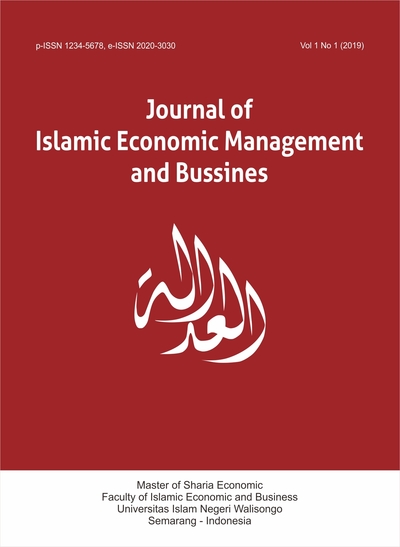The impact of product quality and service quality on consumer loyalty (case study of Bandeng Rozal in Bandengan village, Kendal district, Kendal regency)
DOI:
https://doi.org/10.21580/jiemb.2019.1.1.3985Keywords:
product quality, service quality, customer loyaltyAbstract
Purpose - The purpose of this research is to test the quality of products and quality of service to consumer loyalty of small business, Bandeng Rozal.
Method - Data were obtained from distributing questionnaires to 100 consumers using simple random sampling and measured by the scale of Likert. Quantitative analysis included validity and reliability test, classic assumption test, multiple linear regression analysis, hypothesis testing through t-test and F test, and analysis of the coefficient of determination (R2), while data processing is run used SPSS 16.
Result - The result showed the variables in this research had a significant effect on consumer loyalty. Based on the F test, it showed that variables in this study in which they were product quality and service quality simultaneously or jointly have a significant effect on consumer loyalty.
Implication - This result can assist small business in increasing their consumer loyalty.
Originality - This research focuses on small business adaptability in competing in the industry with a marketing perspective.
Downloads
References
Andanawari, Rachma Anindya. Pengaruh Harga, Lokasi, dan Kualitas Produk Terhadap Keputusan Pembelian. Universitas Diponegoro. 2014.
Arikunto, Suharsimi. Prosedur Penelitian Suatu Pendekatan Praktik. Jakarta: PT. Rineka Cipta. 2006.
Azwar, Syaifudin Metode Penelitian. Jakarta : Pustaka Pelajar. 1999.
Bungin, M. Burhan. Metodologi Penelitian Kuantitatif. Jakarta: Prenada Kencana Group. 2005.
Kotler dan Kevin Lane Keller. Manajemen Pemasaran. Jakarta: Erlangga. Edis.13. 2009.
Maria, Monica dan Mohamad Yusak Anshori. Pengaruh KualitasProduk dan Kualitas Layanan Terhadap Keputusan Konsumen (Studi Kasus Pada Ayam Penyet Surabaya Jl. Dr. Mansyur Medan). Tahun 6 No. 1. 2013.
Martono, Nanang. Metode Penelitian Kuantitatif: Analisis Isi dan Analisis Data Sekunder. Jakarta: Rajawali Pers. cet.3. 2012.
Moureen, Margaretha. Studi Mengenai Loyalitas Pelanggan pada Divisi Asuransi Kumpulan AJB Bumi Putera.
Payne, Andrian. Kebijakan Pemasaran. Jakarta: Bumi Aksara. 2010.
Priyatno, Duwi .Paham Analisis Statistik Data dengan SPSS Yogyakarta: MediaKom, 2010.
Prasetyo, Bambang dan Lina Mifatahul Jannah, Metode Penelitian Kuantitatif: Teori dan Aplikiasi, Jakarta: Raja Grafindo Persada. 2012
Purnomo, Eko. Pengaruh Harga Kualitas Produk dan Lokasi Terhadap Minat Beli Konsumen dalam Membeli Beras Lokal (Studi Kasus Desa Rambah Utama). 2016.
Salma, Fitria Salahika. Pengaruh Kualitas Jasa Prespektif Islam Terhadap Kepuasan dan Loyalitas Pelanggan Hotel Grand Kalimas di Surabaya. Vol. 2 No. 4. Universitas Airlangga. 2015.
Siregar, Syofian. Metode Penelitian Kuantitatif: DilengkapiPerbandingan Perhitungan Manual & SPSS Edisi Pertama. Jakarta:Prenadamedia Group. 2015
Sugiyono, Metode Penelitian Pendidikan; Pendekatan Kuantitatif, Kualitatif dan R & D, Bandung: Alfabeta. 2010.
Sugiyono. Metode Penelitian Bisnis. Bandung: Alfabeta. 2008.
Supranto dan Nandan Limakrisna. Perilaku Konsumen dan Strategi Pemasaran Untuk Memenangkan Persaingan. Jakarta: Mitra Wacana Media. 2010.
Soewadji, Yusuf. Pengantar Metodologi Penelitian. Jakarta: Mitra Wacana Media. 2012.
Tamba, Evetri Juliana dkk.. Pengaruh Kualitas Pelayanan Terhadap Loyalitas Konsumen pada Shine Holiday PT. Sinar. 2017.
Tjiptono, Fandy. Strategi Pemasaran. Jogyakarta: Andi Ofset. Edisi Pertama. 2007.
Hasil Wawancara dengan Bapak Rozikin selaku pemilik UKM Bandeng Rozal Tanggal 11 Maret 2019
Al- Quran dan terjemah
Hasil Wawancara dengan Bapak Rozikin selaku pemilik UKM Bandeng Rozal Tanggal 14 September 2018 jam 16.00 WIB.
https://www.hukumonline.com/pusatdata/detail/842/node/258/keputusan-presiden-nomor-99-tahun-1998 diakses pada 19 Oktober 2018.
Downloads
Published
Issue
Section
License
Authors who publish with this journal agree to the following terms:
Authors retain copyright and grant the journal right of first publication with the work simultaneously licensed under a Creative Commons Attribution-ShareAlike 4.0 International License that allows others to share the work with an acknowledgement of the work's authorship and initial publication in this journal.
Authors are able to enter into separate, additional contractual arrangements for the non-exclusive distribution of the journal's published version of the work (e.g., post it to an institutional repository or publish it in a book), with an acknowledgement of its initial publication in this journal.
Authors are permitted and encouraged to post their work online (e.g., in institutional repositories or on their website) prior to and during the submission process, as it can lead to productive exchanges, as well as earlier and greater citation of published work (See The Effect of Open Access).



